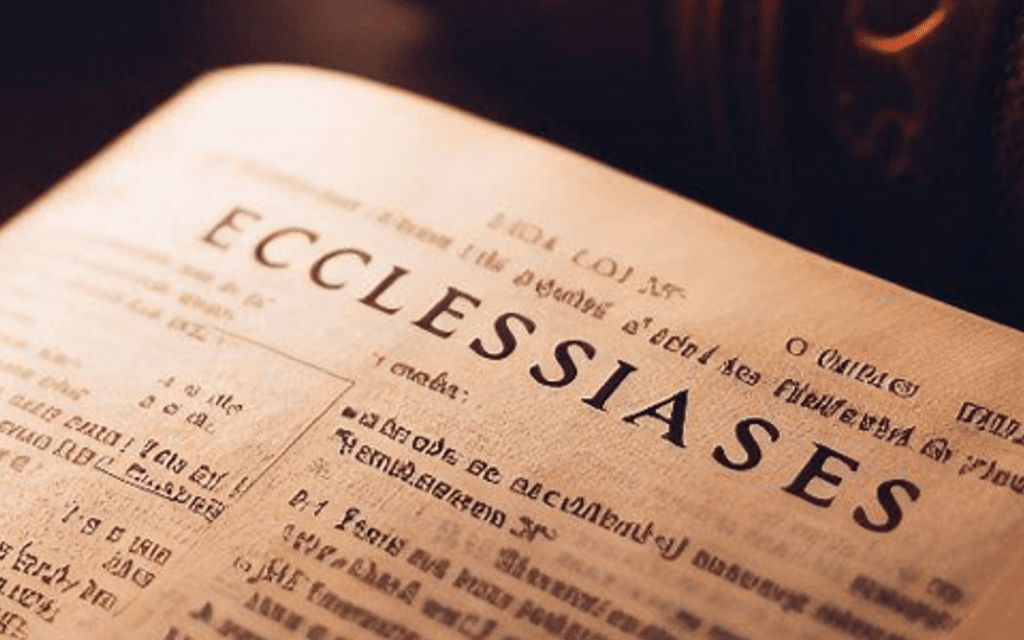As a Christian who has spent countless hours studying the Bible, I’ve often wondered why certain books were included or excluded from the sacred text.
One book that has always intrigued me is Ecclesiastes, also known as Koheleth. It’s a fascinating exploration of life’s meaning and purpose, filled with wisdom and insightful observations.
But despite its profound impact on Jewish and Christian thought, Ecclesiastes remains a controversial and debated book within the Church.
So, what exactly led to its removal from the Bible? And does this decision hold any weight today? Let’s delve deeper into the history and context surrounding Ecclesiastes and explore the reasons behind its exclusion from the canon.
What Is Ecclesiastes?
Before we dive into the controversy surrounding Ecclesiastes, let’s first understand what the book is all about. Written by King Solomon, Ecclesiastes is a collection of reflections on life, death, and everything in between.
It explores themes such as the fleeting nature of pleasure, the futility of human endeavors, and the search for meaning and purpose in life. Throughout the book, Solomon poses difficult questions and offers thought-provoking answers, challenging readers to question their assumptions and seek a deeper understanding of reality.
One of the most famous passages in Ecclesiastes comes from chapter 1 verse 2, where Solomon declares, “Vanity of vanities! All is vanity.” This statement encapsulates the central theme of the book – that much of what humans pursue in life is ultimately empty and meaningless.
Despite our efforts to accumulate wealth, power, and pleasure, these things cannot fill the void left by the absence of God. Instead, we must turn to Him for true fulfillment and satisfaction.
Reasons why Ecclesiastes was removed from the Bible
Here is a list of potential reasons why Ecclesiastes was removed from the Bible:
Its skeptical tone and questioning of God’s justice
- Ecclesiastes expresses doubts about divine providence and questions why bad things happen to good people. This clashed with Church doctrine.
Contradictory ideas about the afterlife
- Some verses suggest no afterlife, while others reference judgment after death. This lack of clarity troubled Church leaders.
Too much focus on the meaninglessness of life
- Much of the book dwells on the vanity and fleeting nature of life “under the sun.” Some felt its gloomy outlook didn’t fit Scripture.
Philosophical ideas seen as too secular or humanistic
- Ecclesiastes references Greek philosophies and relies more on human reason than divine revelation. This made some Church authorities uncomfortable.
Seeming endorsement of immoral behavior
- There are references to foolishness, pleasure-seeking, and sensuality that some felt promoted sinful lifestyles.
Emphasis on the present rather than the eternal
- The book urges enjoying life in the moment rather than focusing on the afterlife. This was at odds with the Church’s teachings.
Overall cynical message didn’t align with Christian hope
- Some Church fathers felt Ecclesiastes lacked the joyful hope central to the Christian message. Its critical perspectives did not fit their vision.
Also Read: Crow Spiritual Meaning & Symbolism In Bible
Historical Context
To fully understand why Ecclesiastes was removed from the Bible, we need to examine the historical context in which it was written.
At the time, Judah was undergoing significant political and cultural changes. After centuries of exile in Babylon, the Jews had returned to their homeland and were rebuilding their society.
They faced numerous challenges, including opposition from neighboring nations, internal strife, and the struggle to maintain their identity as God’s chosen people.
It was during this tumultuous period that Ecclesiastes was likely composed. Scholars believe that the book was written sometime between the 6th and 4th century BC, during the reign of the Israelite kings Hezekiah and Josiah.
These rulers were known for their commitment to reforming the nation and returning to the ways of God, which may explain why Ecclesiastes emphasizes the importance of seeking a closer relationship with Him.
Despite its message of hope and encouragement, however, Ecclesiastes also contained elements that were deemed problematic by some early Christians. Its emphasis on the fleeting nature of earthly pleasures and the futility of human striving clashed with the emerging doctrine of salvation through faith alone. Additionally, Ecclesiastes contains several references to pagan practices and beliefs, which may have raised concerns among conservative factions within the Church.
Controversy Surrounding Ecclesiastes
The debate over whether Ecclesiastes should be included in the Bible began soon after its composition. Some early Christian leaders, such as Augustine of Hippo, praised the book for its wisdom and encouraged its inclusion in the canon. Others,
however, expressed reservations about its teachings and questioned its relevance to the Christian faith. Among these critics was Origen of Alexandria, an influential theologian who argued that Ecclesiastes contained errors and contradictions that could lead astray those who took its teachings too literally.
Origen’s criticisms focused primarily on two key issues: the book’s apparent denial of the resurrection and its seeming endorsement of pagan philosophies.
In Ecclesiastes 9:10, Solomon writes, “For whatever your hand finds to do, do it with all your might; for there is no plan nor purpose except what is established by the Lord beforehand.” This passage has been interpreted by some as suggesting that human actions are predetermined and that there is no point in striving for good deeds or righteousness.
Similarly, in chapters 7 and 8, Solomon engages in dialogue with a wise woman who seems to advocate for a kind of moral relativism, arguing that the pursuit of happiness justifies even the most questionable behavior.
These objections, coupled with the growing influence of Gnosticism and other heretical movements within Christianity, led many early church fathers to question the authenticity and authority of Ecclesiastes. As a result, the book was gradually marginalized and eventually excluded from the Old Testament canon.
The Impact of Ecclesiastes Today
Despite its exclusion from the Bible, Ecclesiastes continues to be widely studied and appreciated by scholars and laypeople alike.
Its timeless insights into the human condition have resonated with generations of readers, inspiring reflection, contemplation, and spiritual growth.
Many modern Christians find solace and inspiration in the book’s messages of hope, resilience, and the importance of seeking a deeper connection with God.
Furthermore, Ecclesiastes has played a crucial role in shaping Jewish thought and practice.
The book’s emphasis on the fleeting nature of earthly pursuits and the importance of living in accordance with God’s will aligns closely with traditional Jewish beliefs about the afterlife and the ultimate purpose of existence.
As a result, Ecclesiastes remains an integral part of Jewish liturgical tradition and devotional practice.
In light of these factors, it’s worth considering whether the decision to exclude Ecclesiastes from the Bible was truly justified.
While the book does contain elements that may challenge certain Christian doctrines, its overall message of seeking wisdom, justice, and a closer relationship with God remains deeply relevant and meaningful.
Ultimately, the value of Ecclesiastes lies not in its status as scripture but in its ability to inspire us to live more intentional, compassionate, and spiritually fulfilled lives.
Conclusion
Ecclesiastes is a remarkable book that invites us to ponder the mysteries of life and the universe.
Through its poetic reflections and powerful insights, Solomon challenges us to question our assumptions, embrace humility, and seek a deeper understanding of reality.
Whether you are a seasoned scholar or a curious reader, Ecclesiastes offers a rich tapestry of wisdom and inspiration that transcends time and culture.
While the reasons behind its exclusion from the Bible remain a subject of ongoing debate, there is no doubt that Ecclesiastes retains its power and relevance for believers and nonbelievers alike.
By engaging with its timeless teachings, we can enrich our lives, cultivate a greater appreciation for the beauty and complexity of creation, and draw closer to the heart of God.
Refrences:



















